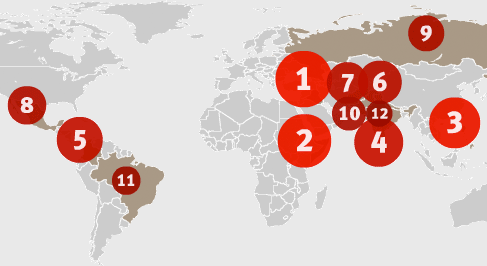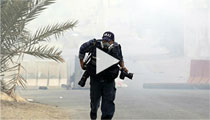The Philippines remained one of the most dangerous places in the world to be a journalist. At least one journalist, Christopher Guarin, a broadcaster and newspaper publisher, was killed in relation to his work. Four others were killed under unclear circumstances, and at least two more were attacked by unidentified gunmen. Despite President Benigno Aquino III’s vow to achieve justice in journalist murders, the Philippines ranked third-worst worldwide on CPJ’s Impunity Index, which spotlights countries where journalists are murdered regularly and killers go free. The landmark prosecution of suspects in the 2009 Maguindanao massacre moved at a sluggish pace and was dealt a severe setback with the killing of a key witness. A new Cybercrime Prevention Act gave officials discretionary power to shut down websites and impose prison terms of up to 12 years for online defamation. Amid an outcry by press freedom and civil society groups, as well as legal challenges by petitioners, the Supreme Court issued a temporary restraining order blocking the law’s implementation.
Philippines
» Maguindanao massacre trial stalls as witness is murdered.
» Repressive Internet law draws outcry, high court injunction.
The Philippines remained one of the most dangerous places in the world to be a journalist. At least one journalist, Christopher Guarin, a broadcaster and newspaper publisher, was killed in relation to his work. Four others were killed under unclear circumstances, and at least two more were attacked by unidentified gunmen. Despite President Benigno Aquino III’s vow to achieve justice in journalist murders, the Philippines ranked third-worst worldwide on CPJ’s Impunity Index, which spotlights countries where journalists are murdered regularly and killers go free. The landmark prosecution of suspects in the 2009 Maguindanao massacre moved at a sluggish pace and was dealt a severe setback with the killing of a key witness. A new Cybercrime Prevention Act gave officials discretionary power to shut down websites and impose prison terms of up to 12 years for online defamation. Amid an outcry by press freedom and civil society groups, as well as legal challenges by petitioners, the Supreme Court issued a temporary restraining order blocking the law’s implementation.
At least 73 Philippine journalists have been killed since 1992, making the Philippines the second deadliest country in the world for the press.
With Internet penetration increasing significantly since 2007, more Filipinos are going online to access news reports and use social media, according to the most recent data by the International Telecommunication Union, or ITU.
At least 55 journalist murders have gone unsolved over the past decade, making the Philippines one of the world's worst nations at combating deadly, anti-press violence, according to CPJ's Impunity Index.

| 1. Iraq 2. Somalia 3. Philippines 4. Sri Lanka | 5. Colombia 6. Nepal 7. Afghanistan 8. Mexico | 9. Russia 10. Pakistan 11. Brazil 12. India |
The government is seeking to limit online freedom at a time when social media use is growing in popularity. The Philippines ranked among the world's top 10 in the number of Facebook users, according to November 2012 data compiled by Socialbakers, the social media statistics aggregator.
167.5 million: United States
60.7 million: Brazil
60.5 million: India
50.5 million: Indonesia
39.4 million: Mexico
33.3 million: United Kingdom
31.4 million: Turkey
29.9 million: Philippines
25.3 million: France
25 million: Germany

